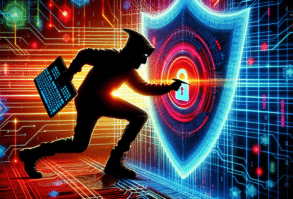In today’s digital age, cybersecurity has become more important than ever. With the constant threat of data breaches and cyber attacks, it is crucial for individuals to take proactive measures to protect themselves and their sensitive information. In this article, we will explore three key aspects of cybersecurity: daily tips, empowering end users, and the importance of education. Whether you are a college student, a working professional, or simply someone who values their online privacy, this article will provide you with valuable insights and practical advice to enhance your cybersecurity practices. So, let’s dive in and discover how to keep you and your data secure in this ever-evolving digital landscape.
- 1. "Cybersecurity 101: Daily Tips to Keep You and Your Data Secure"
- 2. "Empowering End Users: Simple and Effective Cybersecurity Practices"
- 3. "Knowledge is Power: The Importance of Cybersecurity Education in the Digital Age"
1. "Cybersecurity 101: Daily Tips to Keep You and Your Data Secure"
Cybersecurity 101: Daily Tips to Keep You and Your Data Secure
In today’s digital age, cybersecurity has become more important than ever. With cyber threats becoming increasingly sophisticated, it is crucial for individuals to take proactive steps to protect themselves and their data. In this section, we will discuss some daily tips that can help you enhance your cybersecurity and safeguard your sensitive information.
1. Keep your devices up to date: One of the simplest yet often overlooked steps in maintaining cybersecurity is ensuring that all your devices, including smartphones, laptops, and tablets, are running the latest software updates. These updates often include security patches that address vulnerabilities that cybercriminals may exploit. Regularly updating your devices will help protect you from potential attacks.
2. Use strong, unique passwords: Strong and unique passwords are the first line of defense against unauthorized access. Avoid using common passwords such as "123456" or "password." Instead, create passwords that are at least eight characters long and include a combination of letters, numbers, and special characters. Additionally, use different passwords for each online account to minimize the risk of a single breach compromising multiple accounts.
3. Enable two-factor authentication (2FA): Two-factor authentication adds an extra layer of security by requiring users to provide two forms of identification before accessing an account. Typically, this involves entering a password and then providing a unique code sent to a trusted device. Enabling 2FA significantly reduces the risk of unauthorized access, even if your password gets compromised.
4. Be cautious with email attachments and links: Cybercriminals often use phishing emails to trick unsuspecting users into revealing sensitive information or installing malware. Exercise caution when opening email attachments or clicking on links, especially if the sender is unfamiliar. Verify the legitimacy of the sender and scrutinize the email for any signs of suspicious activity, such as misspellings or requests for personal information.
5. Regularly back up your data: Data backups are essential for both personal and professional users. In the event of a cyber attack or system failure, having a recent backup ensures that you can restore your data and resume normal operations. Consider using cloud storage or external hard drives to regularly back up your important files and documents.
6. Educate yourself on cybersecurity best practices: End user security is a shared responsibility. Stay informed about the latest cybersecurity threats and best practices by reading reputable sources, attending webinars or workshops, and following cybersecurity experts on social media. Continuously educating yourself will help you identify potential risks and make informed decisions to protect your data.
By following these daily cybersecurity tips, you can significantly reduce the risk of falling victim to cybercriminals and keep your data secure. Remember, cybersecurity is an ongoing effort, so it is important to stay vigilant and adapt to the ever-evolving threat landscape.
2. "Empowering End Users: Simple and Effective Cybersecurity Practices"
In today’s digital age, cybersecurity is of utmost importance. With cyber threats becoming more sophisticated and prevalent, it is crucial for end users to be equipped with the knowledge and tools to protect themselves and their data. Empowering end users with simple and effective cybersecurity practices is essential in creating a strong defense against cyber threats.
One of the most basic yet crucial cybersecurity practices is the use of strong and unique passwords. Many people tend to reuse the same password across multiple accounts, making it easier for hackers to gain access to their personal information. Encouraging end users to create strong passwords, consisting of a combination of letters, numbers, and special characters, is an effective way to enhance their online security.
Another important practice is to regularly update software and devices. Software updates often include security patches that address vulnerabilities in the system. Keeping devices and software up to date ensures that end users have the latest security measures in place, protecting them from potential cyber threats.
Educating end users about the dangers of phishing emails and suspicious links is also crucial. Phishing attacks are one of the most common methods used by cybercriminals to gain unauthorized access to sensitive information. By teaching end users to be cautious when clicking on links or providing personal information online, they can better protect themselves from falling victim to phishing scams.
Furthermore, enabling two-factor authentication (2FA) adds an extra layer of security to end users’ accounts. 2FA requires users to provide a second form of authentication, such as a unique code sent to their mobile device, in addition to their password. This additional step makes it much more difficult for hackers to gain unauthorized access to accounts, even if they manage to obtain the user’s password.
Regularly backing up important data is also a crucial cybersecurity practice. In the event of a cyber attack or data breach, having a recent backup ensures that valuable information can be restored, minimizing the impact of such incidents.
Lastly, fostering a culture of cybersecurity education is essential. End users should be provided with training and resources to stay updated on the latest cybersecurity best practices. This could include workshops, online courses, or informative articles and videos that address common cyber threats and how to prevent them.
By empowering end users with these simple and effective cybersecurity practices, we can collectively create a more secure digital environment. It is crucial that individuals take responsibility for their own cybersecurity and actively engage in ongoing education to stay one step ahead of cybercriminals. Together, we can build a safer digital world for everyone.
3. "Knowledge is Power: The Importance of Cybersecurity Education in the Digital Age"
In today’s digital age, cybersecurity has become more crucial than ever before. With cyber threats constantly evolving and becoming more sophisticated, it is essential for individuals to stay informed and educated about the best practices for protecting themselves online. This is where cybersecurity education plays a vital role.
Knowledge is power, and this phrase holds true when it comes to cybersecurity. By educating oneself about the risks and vulnerabilities in the digital world, individuals can empower themselves to take proactive steps to protect their personal information, devices, and networks.
Cybersecurity education is not just limited to IT professionals or experts in the field. It is equally important for end users, which includes individuals like you and me who use digital devices and access the internet on a daily basis. We all play a role in ensuring our own cybersecurity.
One of the main reasons why cybersecurity education is crucial is because it helps individuals understand the potential risks and threats they may encounter online. By learning about the various types of cyber attacks, such as phishing, malware, and social engineering, individuals can recognize suspicious activities and take appropriate measures to safeguard their digital presence.
Moreover, cybersecurity education provides individuals with the knowledge and skills to implement effective security measures. This includes practices like using strong and unique passwords, enabling two-factor authentication, keeping devices and software updated, and being cautious while clicking on links or downloading files.
Another significant aspect of cybersecurity education is promoting a culture of security awareness. By raising awareness about the importance of cybersecurity, individuals can become more conscious of their online activities and develop good cybersecurity habits. This could include being cautious about sharing personal information, being mindful of the websites and applications they use, and being vigilant about protecting their digital identities.
Furthermore, cybersecurity education helps individuals understand the consequences of cyber attacks, not only on a personal level but also on a larger scale. Cyber attacks can disrupt businesses, compromise sensitive data, and even impact national security. By understanding the potential consequences, individuals are more likely to take cybersecurity seriously and actively contribute to a safer digital environment.
In conclusion, in the digital age, cybersecurity education is of utmost importance. It empowers individuals with the knowledge and skills to protect themselves from cyber threats, promotes a culture of security awareness, and contributes to a safer digital environment. By recognizing the significance of cybersecurity education and staying informed, we can all play a part in safeguarding our digital lives.
In conclusion, cybersecurity is a critical aspect of our daily lives in the digital age. As technology continues to advance at a rapid pace, it is essential for individuals to stay informed and take proactive steps to protect themselves and their data. By following the daily tips outlined in this article, such as using strong passwords, keeping software up to date, and being cautious of phishing attempts, anyone can significantly reduce their risk of falling victim to cyber threats.
Furthermore, empowering end users with simple and effective cybersecurity practices is key to creating a safer online environment for everyone. It is not solely the responsibility of IT professionals or cybersecurity experts to protect against threats; every individual has a role to play in safeguarding their own digital lives. By implementing basic security practices, such as regularly backing up data, using multi-factor authentication, and being mindful of the websites and applications they interact with, end users can significantly fortify their defenses against cyber attacks.
Lastly, the importance of cybersecurity education cannot be overstated. With the ever-evolving nature of cyber threats, it is crucial to continuously enhance our knowledge and understanding of cybersecurity. By staying informed about the latest trends, techniques, and technologies, we can better equip ourselves to identify and respond to potential risks. Investing in cybersecurity education, whether through formal training programs or self-study, can provide individuals with the tools and knowledge they need to navigate the digital landscape safely.
In conclusion, cybersecurity is a shared responsibility that requires a collective effort from individuals, organizations, and society as a whole. By implementing daily tips, empowering end users, and prioritizing cybersecurity education, we can create a more secure and resilient digital world for everyone. So, let’s stay vigilant, stay informed, and stay secure in the face of evolving cyber threats.






